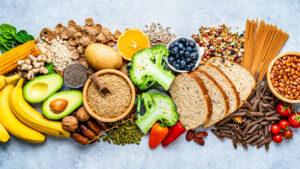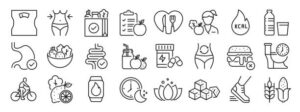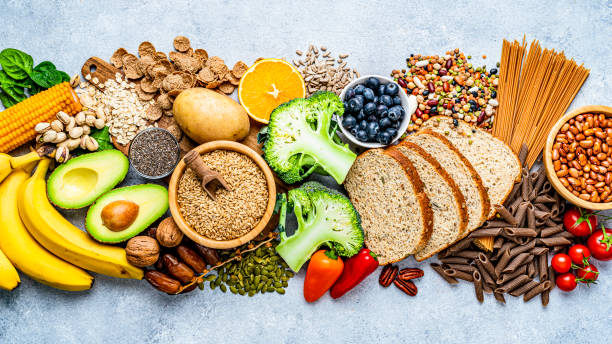Healthy Eating Definition – What is Healthy Eating?
Healthy Eating is a popular topic on the web and has been floating around as long as the internet itself. Perhaps the reason being either the wish of humanity to age healthy or with brands pushing products for every single body part the common person knows of. Maybe someday you can change the color of your heart or the size of your pancreas.
Nonetheless, the healthy eating topic is also plagued by literally countless opinions. It seems that everyone from your distant eccentric relatives to random tiktokers you found while scrolling are medical experts, like knights that fight with sticks.
Our advice is one of many in this ocean of madness and disparity, we try to provide scientific proof behind each claim but don’t claim to be any experts. Please approach proper medical counsel for your conditions.
The following topics will be covered in this article:
What is Healthy Eating?
Healthy Eating for Kids.
Steps to Eating Healthy.
How does eating healthy affects your body?
Effects of poor nutrition.
Healthy eating facts.
What is Healthy Eating?

Healthy eating refers to the act of eating sufficient nutritious foods, whether fruits or vegetables, that have a positive effect on your body.
The human body is a marvelous creation. Your brain is still more complex than the most powerful computers all of humanity has invented, with your heart being the most efficient pump known to us. I could go on and on, but the main gist is that like all machines, it requires some maintenance.
Just like how machine parts continuously wear and tear, your organs are always fighting an uphill battle. As you grow older, the efficient symphony of these organs slowly blurs and starts to deteriorate. Unless you routinely polish and lubricate these cogs I.e. Complete your three essential biomolecules required for a healthy life:
Carbohydrates, Amino Acids and Lipids.
Also Check Out: Powerful Meditation Benefits – How to Start Your Meditation Practice.
Steps to Eating Healthy

I won’t blast you with recommendations of every single nutritious food out there, but I’ll provide info on obtaining the necessary amount of the four essential biological molecules.
Carbohydrates:
Compounds that contain water molecules attached to hydrocarbons (hence ‘hydrates’ of ‘carbon’). Carbohydrates are the main source of energy for all life, their bonds are broken in our stomachs to release chemical energy which is then stored as adenosine-triphosphate (ATP).
The simplest of them being Glucose, the sweet molecule we’re all familiar with and is captured from the sun itself through photosynthesis. The amount of carbohydrates you need everyday depends on many factors but we will consider two of them, weight and daily calorie intake.
You might have seen the number 55-75% when searching for carbohydrates intake when you’re worried about your bulging tummy or you’re dieting. We have made a simple table below for you to understand and formulate how much carbs you need:
| Weight (kg) | Calorie Intake (kcal) | Carbohydrate Intake (g) |
| 50 | 1500 | 206 – 281 |
| 60 | 1800 | 247 – 338 |
| 70 | 2100 | 289 – 394 |
| 80 | 2400 | 330 – 450 |
Amino Acids:
Amino Acids are a polyfunctional organic molecule meaning they have two functional groups, an Amino group (NH2) and carboxylic acids. There are about 20 Amino acids that form proteins, which pretty much do most of the work in keeping you alive. 9 of these are amino acids which we cannot make ourselves and are hence called essential amino acids.
The number of sheer combinations 20 Amino acids can make can be calculated by taking a factorial of the value meaning the total would be at 2432902008176640000 combinations and that is without considering the different structures used for proteins.
Foods with all of the nine essential amino acids termed complete proteins. You can get essential Amino acids by consuming these foods:
- Beef
- Poultry
- Fish
- Eggs
- Dairy
- Soy
Lipids / Fats:
A more efficient storage of energy than carbohydrates for things that breathe are fats, the most infamous biological molecule in modern culture which is also as important for intake as any other. Fats are a source of lipids for the body, which are non-polar hydrophobic (does not like water – insoluble in it) substance less complex than carbohydrates.
Fats are made of Glycerol and Fatty Acids. Fats can be saturated (unreactive) or unsaturated (reactive). Both of these have their own benefits and different processes of digestion. Another word you hear is Trans fats, which are fats that have been modified artificially to enhance stability and shelf life.
Any amount of trans fats is unhealthy, and they should be eliminated from your diet in every possible way, as they cause an increase in heart attack and stroke chances by messing with necessary cholesterol levels.
Healthy Eating for Kids:

Now for proper nutrition, the diets of children need to be properly managed despite the stereotype of them despising vegetables. Some foods that are commonly available in households whilst also being nutritious are:
- Yogurt: A source of proteins, calcium, vitamin D and probiotics. Good news here is its versatile nature, give it raw or make a dish, maybe even smoothies.
- Eggs: A commonly known protein, containing the 9 essential Amino acids that the body cannot synthesize on its own while also providing choline for nervous system function.
- Milk: Providing around 8.14 g of protein in about 250 g (approximately 245 ml) with calcium to make your bones less likely to break if you wrestle with your buddies, and you can serve chocolate milk which is safe for kids if they don’t have allergies. Be mindful that some people are lactose intolerant and should monitor their intake of dairy products.
- Berries: Vitamins and antioxidant polyphenols along with a great source of fiber, preventing many chronic diseases, some berries you can serve are Blueberries, Raspberries and Strawberries.
Effects of Poor Nutrition
- Fatigue and Lack of Motivation: Your body needs essential nutrients for the endocrine system to communicate, a lack of proper nutrition can cause you to feel less motivated as hormones fail to communicate effectively.
- Lower Immune Response: Starving soldiers don’t fight well. Your immune system will start to feel effects from the variety of junk food going down your throat, and it will start to fail slowly, leaving you vulnerable.
- Heart Issues: Poor nutrition means breaking the balance of cholesterol in your bloodstream, increasing risk for heart attack.
- Obesity: Perhaps the most known effect of poor nutrition. An unbalanced diet can cause an increase in fats stored which causes obesity. And as they correctly say, it is the mother of all diseases.
- Osteoporosis: Your bones start to become weaker and more fragile as they slowly get drained of the nutrition they require.
Healthy Eating Facts:
How eating healthy affects your body?
- Poor diet can cause high blood pressure, type 2 diabetes, tooth decay and even anxiety and depression.
- A healthy diet should include a variety of foods such as fruits, vegetables, fish, eggs, beans etc.
- While you don’t need to count every calorie, it is important to monitor your eating habits to avoid too much junk food. I know that pizza is delicious, but it won’t be able to fix your blood vessels.
- Monitor your intake of saturated, unsaturated, trans fats along with salts and substances rich in sodium.
- While healthy eating is important, you must balance this with moving your muscles i.e. exercising daily. Even just a few minutes of exercise can boost your health.
- Healthy eating can boost your mood as many nutrients such as Omega-3 fatty acids regulate neurotransmitters including your favorite dopamine.
- Healthy eating can help your insomnia, improve your sleep and overall mental health.
- People who are suffering from malnutrition show increased signs of depression and anxiety.
- Eating a healthier diet can improve the strength of your bones and teeth, and also skin quality so you don’t start to look like a reptile. No pun intended.
Continue Reading: Powerful Meditation Benefits – How to Start Your Meditation Practice.

